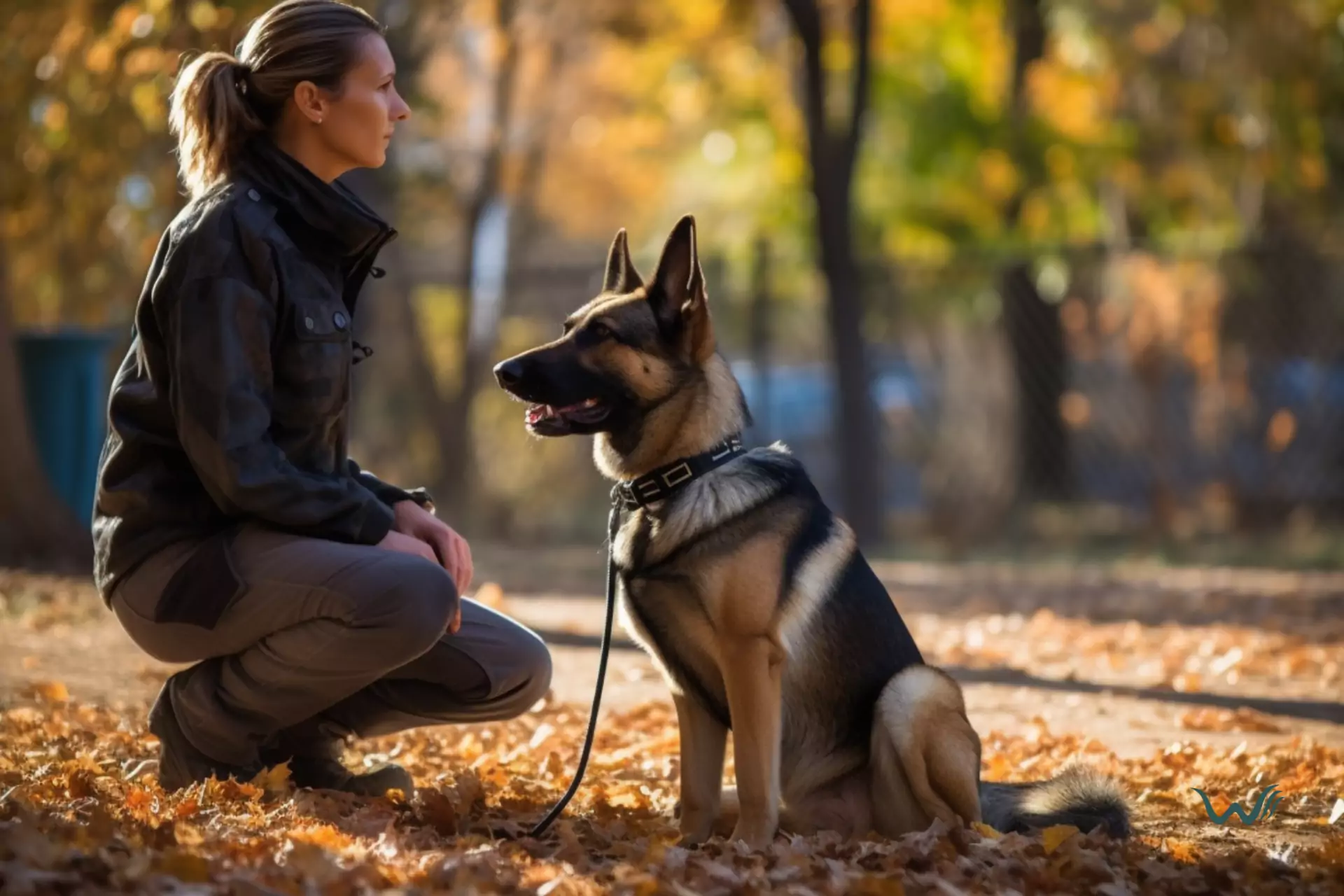

Empowering Senior Pets: Positive Training & Memory
by Haley Mills
Last updated: April 21, 2024
Verified and Approved by:
Angela Morris,
MSW, LCSW
Fact Checked

Are you the proud owner of a senior pet who may have a few more gray hairs than when you first brought them home? Well, fear not, because there’s an exciting way to help maintain their cognitive abilities and keep their minds sharp – positive reinforcement training! Yes, that’s right, training isn’t just for puppies and kittens anymore.
In this article, we’ll dive into the world of training techniques specifically tailored for your wise and experienced furry friend.
Now, you might be wondering, what exactly are senior pet cognitive abilities? Well, just like us humans, our beloved pets can experience a decline in cognitive function as they age. This can manifest as forgetfulness, confusion, and a general slowing down of their mental processes. But don’t worry, there’s hope!
Positive reinforcement training can be a game-changer for our senior pets, helping to maintain their cognitive abilities and keep their minds sharp. So, grab your treat bag and get ready to embark on a training adventure that will not only engage your pet’s mind but also bring joy and laughter to both of you.
Key Takeaways
- Senior pets can experience a decline in cognitive function as they age, but positive reinforcement training can help maintain and improve their cognitive abilities.
- Training sessions should be shorter and cater to the abilities of senior pets, and monitoring and adjusting training methods is important for optimal results.
- Engaging senior pets in activities that challenge their minds, such as puzzle toys, scent games, training sessions, and interactive toys, can stimulate their cognitive abilities.
- Senior pets need extra love, attention, and mental stimulation to keep their minds sharp and spirits high, and regular mental stimulation can reduce the risk of cognitive decline.
Understanding Senior Pet Cognitive Abilities
Did you know that a study found that approximately 28% of dogs over the age of 11 showed signs of cognitive dysfunction? That’s right, our furry friends can experience a decline in their cognitive functions, just like us humans.
So, next time you find your senior pet staring blankly into space, don’t be too quick to dismiss it as them just being a little “senile.” They might just be lost in deep thought, contemplating the meaning of life, or maybe they’re just daydreaming about that delicious treat you promised them earlier. Either way, it’s essential to recognize that their cognitive abilities might not be as sharp as they once were.
There are ways to help maintain and even improve their cognitive abilities. Just like how we exercise our brains by solving puzzles or playing brain-teasing games, our senior pets can benefit from mental stimulation too. Engaging them in activities that challenge their minds, like puzzle toys or interactive games, can help keep their cognitive abilities sharp. Plus, it’s a great way to bond with them and have some fun together.
So, don’t hesitate to unleash your inner game master and come up with creative ways to keep your senior pet mentally active. Who knows, you might even discover that they’re a mastermind at solving puzzles or have a hidden talent for learning new tricks. After all, age is just a number, and with the right positive reinforcement training, our senior pets can continue to amaze us with their cognitive abilities.
The Benefits of Positive Reinforcement Training
One of the many perks of using positive reinforcement techniques is how it helps senior furry friends stay sharp. Just like humans, as pets get older, their cognitive abilities can start to decline. It’s like they have a little senior moment every now and then.
But fear not, positive reinforcement training can help keep their minds in tip-top shape. By rewarding them for good behavior, you’re giving their brain a little workout. It’s like doing Sudoku for dogs, but with treats instead of numbers. So not only are you teaching them new tricks, you’re also keeping their minds active and engaged.
But wait, there’s more! Positive reinforcement training doesn’t just benefit their cognitive abilities, it also improves their overall well-being. When you use positive reinforcement techniques, you’re creating a positive and loving environment for your furry friend. It’s like they’re living in a perpetual warm hug. And who doesn’t want that?
Plus, it strengthens the bond between you and your pet. You become their best friend, their confidante, their partner in crime. It’s like you’re in a buddy cop movie, but instead of fighting crime, you’re just teaching your dog to sit. So not only are you keeping their minds sharp, you’re also creating a loving and unbreakable bond. It’s a win-win-win situation, and let’s be honest, who doesn’t love a good win-win-win situation?
Tailoring Training Techniques for Senior Pets
When it comes to teaching old dogs new tricks, you’ll need to think outside the box and get creative. Senior pets may not have the same energy and agility as their younger counterparts, but that doesn’t mean they can’t continue to learn and engage their minds.
One technique that works well with senior pets is breaking down the training into smaller, bite-sized sessions. Just like us humans, their attention spans may not be as long as they used to be, so keeping the training sessions short and sweet is key. Plus, it gives you more time for cuddles and treats!
Another critical aspect of training senior pets is to choose exercises that cater to their abilities. For example, instead of teaching them complex tricks that require a lot of physical effort, focus on mental stimulation exercises that can help maintain their cognitive abilities. Puzzle toys or scent games are great options to keep their brains sharp.
Stimulating Cognitive Abilities through Enrichment Activities
Engage your aging pet’s mind by providing them with stimulating activities that keep them mentally sharp. Just like humans, senior pets can benefit from cognitive enrichment to maintain their cognitive abilities and prevent cognitive decline.
Here are some fun and engaging activities you can try with your furry friend:
- Puzzle toys: Treat-dispensing puzzle toys are a great way to challenge your pet’s problem-solving skills. Hide treats or kibble inside the toy and watch as they figure out how to get to the reward. It’s like a game of “hide and seek” for pets!
- Scent games: Dogs have an incredible sense of smell, so why not put it to good use? Hide treats or toys around the house and encourage your pet to use their nose to find them. You can even make it more challenging by hiding the treats in different rooms or using scent puzzles.
And here are two more ideas to keep your pet’s mind active and engaged:
- Training sessions: Training is not just for puppies! Senior pets can still learn new tricks and commands, and it’s a great way to keep their minds sharp. Plus, it’s a fun bonding activity for both of you. Teach them new tricks or reinforce the ones they already know – the possibilities are endless!
- Interactive toys: There are plenty of interactive toys available that are designed to engage your pet’s mind. From treat-dispensing balls to puzzle feeders, these toys require your pet to think and problem-solve to get to the reward. It’s like a mental workout for your furry friend!
How Can Positive Reinforcement Training Help Maintain Cognitive Abilities in Senior Pets?
As senior pets age, maintaining cognitive abilities becomes increasingly important. Positive reinforcement training for small pets can help keep their minds sharp and engaged. By incorporating treats, praise, and rewards into daily activities, older pets can continue to learn and problem-solve, promoting cognitive health and overall wellbeing.
Monitoring and Adjusting Training Methods for Optimal Results
Adjusting the training methods for optimal results requires constant monitoring and fine-tuning to ensure the best outcomes for older animals. Did you know that according to a recent study, senior pets who receive regular mental stimulation are 47% less likely to develop cognitive decline? So, it’s essential to keep a close eye on your furry friend’s progress and make any necessary adjustments along the way. Think of it like tuning a guitar – you want to make sure every string is perfectly in tune to create beautiful music. In this case, the beautiful music is your senior pet’s cognitive abilities.
Let’s imagine a table with three columns and four rows to help you visualize the process of monitoring and adjusting training methods. In the first column, we have the different training methods you’ve been using. In the second column, we have the observed outcomes or behaviors of your senior pet. And in the third column, we have the adjustments you can make to improve those outcomes. Here’s how it might look:
| Training Method | Observed Outcome | Adjustment |
|---|---|---|
| Puzzle Toys | Increased curiosity and problem-solving skills | Increase difficulty level of puzzles |
| Clicker Training | Improved focus and responsiveness | Incorporate more challenging commands |
| Scent Work | Enhanced sense of smell and mental stimulation | Introduce new scents or increase difficulty |
By keeping track of your pet’s progress and making adjustments based on their responses, you can ensure that their cognitive abilities continue to thrive. Remember, just like humans, our senior pets need a little extra love, attention, and mental stimulation to keep their minds sharp and their spirits high. So, keep monitoring, keep adjusting, and keep the positive reinforcement flowing!
Frequently Asked Questions
Can positive reinforcement training be effective for senior pets with cognitive impairments?
Yes, positive reinforcement training can still be effective for your senior furball with cognitive impairments. It may take a bit more patience and creativity, but who said teaching an old dog new tricks couldn’t be a hilarious adventure?
Are there any specific breeds or types of senior pets that are more responsive to positive reinforcement training?
Are there specific breeds or types of senior pets that are more responsive to positive reinforcement training? Well, here’s the suspenseful truth: all senior pets can benefit from positive reinforcement training, regardless of their breed or type!
How long does it typically take to see improvements in a senior pet’s cognitive abilities through positive reinforcement training?
Typically, it takes some time to see improvements in your senior pet’s cognitive abilities through positive reinforcement training. But hey, Rome wasn’t built in a day, right? Just keep at it and you’ll start seeing those adorable lightbulb moments!
Are there any potential risks or drawbacks to using positive reinforcement training for senior pets?
Using positive reinforcement training for senior pets is generally safe and effective. However, it’s important to consider their physical limitations and adjust the training accordingly. Always consult with a veterinarian for personalized advice.
Can positive reinforcement training help prevent or delay cognitive decline in senior pets?
Absolutely! Positive reinforcement training can be a game-changer for your senior furball. It keeps their minds sharp, delays cognitive decline, and helps them feel like Einstein with a treat-filled lab coat. Woof!
Certify Your Emotional Support Animal Today

Why You Can Rely on Us?
At Wellness Wag, we believe your pet deserves care rooted in both science and compassion. Each article is carefully researched, written in clear language for pet owners, and then reviewed by qualified professionals to ensure the information is evidence-based, current, and practical for real-life care. Our goal is to help you feel confident in making informed decisions about your pet’s health and well-being.
Reviewed by
Angela Morris, MSW, LCSW
Angela is a licensed clinical social worker with 20 years of experience in patient advocacy and community mental health. She has assisted numerous clients with ESA evaluations and brings a deep understanding of disability accommodations, ensuring that all information is accurate, supportive, and practical.

Written by :
Haley Mills
Last Updated :
April 21, 2024










